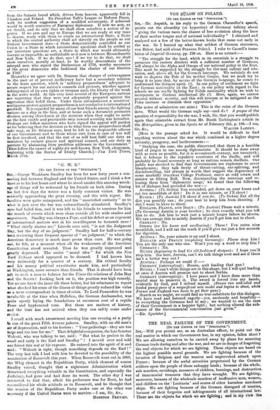"G. W.
[To THE EDITOR OP THE " EPECTATOR.1
fins,—George Washburn Smalley has been for now forty years a eon- 'meting link between England and the United States, and I think a few lines as to his last hours and where he stood amidst this amazing wreck-
age of things will be welcomed by his friends on both sides. During his last few days the writer was a fairly constant visitor. He was evidently approaching the great crossing, and this with regret. His faculties were quite unimpaired, and his "unsatisfied curiosity" as to what is just over the bar was extraordinarily stimulated. Smalley's eyes had failed him, and it was left to his friends to construe for him the march of events which were clean outside all his wide studies and experiences. Smalley was always a Pope, and his defect as an exponent of international matters was in his unwillingness to transmit news ! "What chiefly alarms me," Lincoln once said, "is not the Judgment Day, but the day of no judgment." Smalley had for half-a-century been reviewing those frequent spasms of "no judgment," to which the American democracy is much more prone than ours. He was going out, he felt, at a moment when all the weaknesses of the American Constitution stood revealed. Thus he was greatly impressed and greatly decreased. The entire "moral idea" for which the New York Tribune stood appeared to be doomed. I had known him very intimately for a quarter of a century. His critical faculty and his uneasy political exactitudes made him, and particularly at Washington, more enemies than friends. That it should have been isft to such a man to balance for the Times the relations of John Hay and the Senate! Looking back on it, the position was high comedy. Yet no one knew the inner life there better, but his reluctance to report what shocked his sense of the fitness of things greatly reduced his value e s a mere correspondent in times of crisis. To Lord Pauncefote he was invaluable at the time when Holleben, the German Ambassador, was quite openly laying the foundations at enormous cost of a reptile Press and hyphenated vote. But these are matters of history, and the time has not arrived when they can safely come under review.
I recall with much amusement meeting him one evening at a party
fa one of the great Fifth Avenue palaces. Smalley, with an old man's air of deprecation, said to his hostess : "Your gatherings—they are too large and too late for me." That delightful companion, the late Senator Wolcott, who was talking to me, said : "But what he prefers to tho small and early is the Earl and Smalley" 1 I moved over and told our friend this mot at his expense. He entered into the spirit of it and said "Wolcott is right, though something depends on the Earl ! " The very last talk I had with him he devoted to the possibility of the nomination of Roosevelt this year. When Roosevelt went out in 1909, the Whig element in the Republican Party, which element of course Smalley voiced, thought that a nightmare Administration which threatened everything valuable in the Constitution, and especially the Judiciary, had gone and had done its worst. The other day I was interested to find that, albeit his preference was for Root, he had reconsidered his whole attitude as to Roosevelt, and he thought that the reunion of tho Republican Party under one or the other was necessary if the United States were to survive.—I am, Sir, die.,
bloarrort FREW EN.






























 Previous page
Previous page